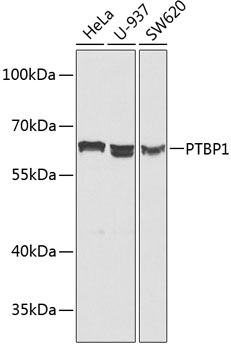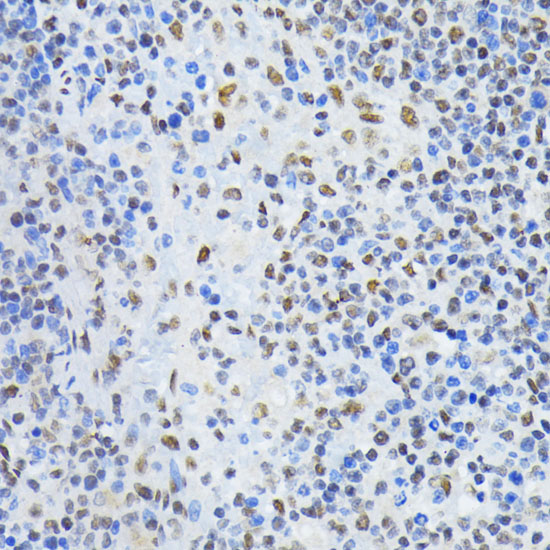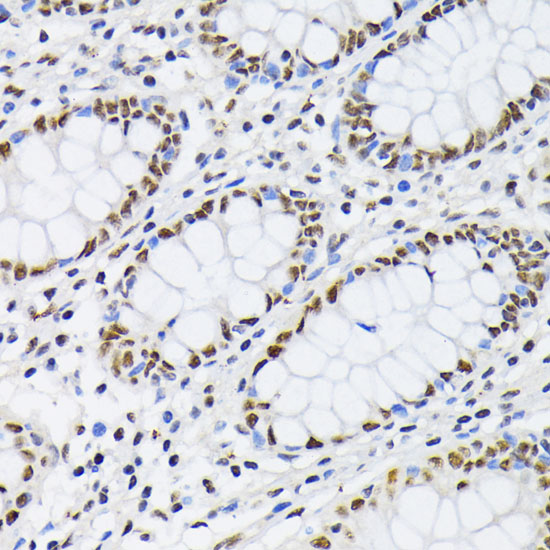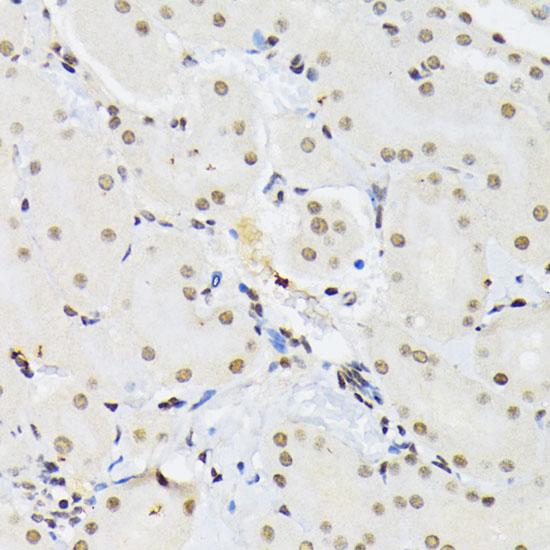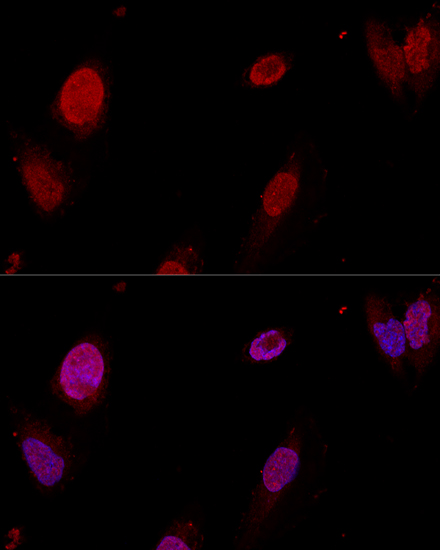Anti-PTBP1 Antibody (CAB1831)
- SKU:
- CAB1831
- Product type:
- Antibody
- Reactivity:
- Human
- Reactivity:
- Mouse
- Reactivity:
- Rat
- Host Species:
- Rabbit
- Isotype:
- IgG
- Research Area:
- Epigenetics and Nuclear Signaling
Frequently bought together:
Description
| 抗体名: | Anti-PTBP1 Antibody |
| 抗体コード: | CAB1831 |
| 抗体サイズ: | 20uL, 50uL, 100uL |
| 申し込み: | WB IHC IF |
| 反応性: | Human, Mouse, Rat |
| 宿主種: | Rabbit |
| 免疫原: | Recombinant fusion protein containing a sequence corresponding to amino acids 1-290 of human PTBP1 (NP_114368.1). |
| 申し込み: | WB IHC IF |
| 推奨希釈: | WB 1:500 - 1:2000 IHC 1:50 - 1:100 IF 1:50 - 1:100 |
| 反応性: | Human, Mouse, Rat |
| ポジティブサンプル: | HeLa, U-937, SW620 |
| 免疫原: | Recombinant fusion protein containing a sequence corresponding to amino acids 1-290 of human PTBP1 (NP_114368.1). |
| 精製方法: | Affinity purification |
| ストレージバッファ: | Store at -20'C. Avoid freeze / thaw cycles. Buffer: PBS with 0.02% sodium azide, 50% glycerol, pH7.3. |
| アイソタイプ: | IgG |
| 順序: | MDGI VPDI AVGT KRGS DELF STCV TNGP FIMS SNSA SAAN GNDS KKFK GDSR SAGV PSRV IHIR KLPI DVTE GEVI SLGL PFGK VTNL LMLK GKNQ AFIE MNTE EAAN TMVN YYTS VTPV LRGQ PIYI QFSN HKEL KTDS SPNQ ARAQ AALQ AVNS VQSG NLAL AASA AAVD AGMA MAGQ SPVL RIIV ENLF YPVT LDVL HQIF SKFG TVLK IITF TKNN QFQA LLQY ADPV SAQH AKLS LDGQ NIYN ACCT LRID FSKL TSLN VKYN NDKS RDYT RPDL PSGD SQPS LD |
| 遺伝子ID: | 5725 |
| Uniprot: | P26599 |
| セルラーロケーション: | Nucleus |
| 計算された分子量: | 57kDa/59kDa |
| 観察された分子量: | 64kDa |
| 同義語: | PTBP1, HNRNP-I, HNRNPI, HNRPI, PTB, PTB-1, PTB-T, PTB2, PTB3, PTB4, pPTB |
| バックグラウンド: | This gene belongs to the subfamily of ubiquitously expressed heterogeneous nuclear ribonucleoproteins (hnRNPs). The hnRNPs are RNA-binding proteins and they complex with heterogeneous nuclear RNA (hnRNA). These proteins are associated with pre-mRNAs in the nucleus and appear to influence pre-mRNA processing and other aspects of mRNA metabolism and transport. While all of the hnRNPs are present in the nucleus, some seem to shuttle between the nucleus and the cytoplasm. The hnRNP proteins have distinct nucleic acid binding properties. The protein encoded by this gene has four repeats of quasi-RNA recognition motif (RRM) domains that bind RNAs. This protein binds to the intronic polypyrimidine tracts that requires pre-mRNA splicing and acts via the protein degradation ubiquitin-proteasome pathway. It may also promote the binding of U2 snRNP to pre-mRNAs. This protein is localized in the nucleoplasm and it is also detected in the perinucleolar structure. Alternatively spliced transcript variants encoding different isoforms have been described. |
| UniProt Protein Function: | hnRNP I: a ubiquitously expressed heterogeneous nuclear ribonucleoprotein (hnRNP). hnRNPs are associated with pre-mRNAs in the nucleus and appear to influence pre-mRNA processing and other aspects of mRNA metabolism and transport. Binds to the polypyrimidine tract of introns. May promote the binding of U2 snRNP to pre-mRNA. Two alternatively spliced isoforms have been described. |
| UniProt Protein Details: | Protein type:RNA-binding; RNA splicing Chromosomal Location of Human Ortholog: 19p13.3 Cellular Component: nucleoplasm; membrane; nucleolus Molecular Function:protein binding; poly-pyrimidine tract binding; RNA binding; nucleotide binding Biological Process: nuclear mRNA splicing, via spliceosome; negative regulation of RNA splicing; negative regulation of nuclear mRNA splicing, via spliceosome; RNA splicing; negative regulation of muscle cell differentiation; gene expression; mRNA processing; regulation of alternative nuclear mRNA splicing, via spliceosome |
| NCBI Summary: | This gene belongs to the subfamily of ubiquitously expressed heterogeneous nuclear ribonucleoproteins (hnRNPs). The hnRNPs are RNA-binding proteins and they complex with heterogeneous nuclear RNA (hnRNA). These proteins are associated with pre-mRNAs in the nucleus and appear to influence pre-mRNA processing and other aspects of mRNA metabolism and transport. While all of the hnRNPs are present in the nucleus, some seem to shuttle between the nucleus and the cytoplasm. The hnRNP proteins have distinct nucleic acid binding properties. The protein encoded by this gene has four repeats of quasi-RNA recognition motif (RRM) domains that bind RNAs. This protein binds to the intronic polypyrimidine tracts that requires pre-mRNA splicing and acts via the protein degradation ubiquitin-proteasome pathway. It may also promote the binding of U2 snRNP to pre-mRNAs. This protein is localized in the nucleoplasm and it is also detected in the perinucleolar structure. Alternatively spliced transcript variants encoding different isoforms have been described. [provided by RefSeq, Jul 2008] |
| UniProt Code: | P26599 |
| NCBI GenInfo Identifier: | 131528 |
| NCBI Gene ID: | 5725 |
| NCBI Accession: | P26599.1 |
| UniProt Secondary Accession: | P26599,Q9BUQ0, |
| UniProt Related Accession: | P26599 |
| Molecular Weight: | 531 |
| NCBI Full Name: | Polypyrimidine tract-binding protein 1 |
| NCBI Synonym Full Names: | polypyrimidine tract binding protein 1 |
| NCBI Official Symbol: | PTBP1 |
| NCBI Official Synonym Symbols: | PTB; PTB2; PTB3; PTB4; pPTB; HNRPI; PTB-1; PTB-T; HNRNPI; HNRNP-I |
| NCBI Protein Information: | polypyrimidine tract-binding protein 1; hnRNP I; RNA-binding protein; 57 kDa RNA-binding protein PPTB-1; heterogeneous nuclear ribonucleoprotein I; heterogeneous nuclear ribonucleoprotein polypeptide I; polypyrimidine tract binding protein (heterogeneous |
| UniProt Protein Name: | Polypyrimidine tract-binding protein 1 |
| UniProt Synonym Protein Names: | 57 kDa RNA-binding protein PPTB-1; Heterogeneous nuclear ribonucleoprotein I; hnRNP I |
| Protein Family: | Polypyrimidine tract-binding protein |
| UniProt Gene Name: | PTBP1 |
| UniProt Entry Name: | PTBP1_HUMAN |
View AllClose


